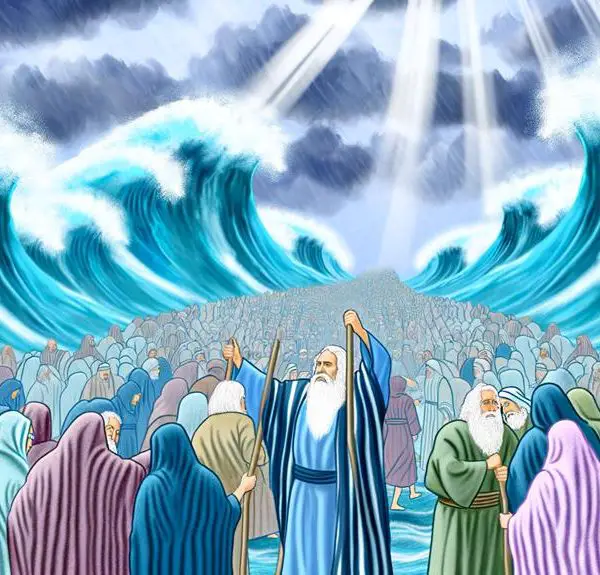Take a deep dive into Genesis Chapter 7, unraveling divine judgment, hope, and salvation through Noah's epic flood narrative.

Bible Study – The Book of Genesis – Chapter 7 – Summary and Analysis
In Genesis Chapter 7, you'll find meticulous divine instructions issued to Noah, showcasing God's omnipotent plan for life preservation. This chapter chronicles a catastrophic global flood, dovetailing divine justice and mercy with destruction. It underscores Noah's steadfast obedience and faith as he gathers selected animals, preserving all species. Unpacking this narrative, important themes emerge: divine judgment, hope, salvation, and a covenantal promise. The chapter's symbolism extends beyond the stories, highlighting divine concern for all life and potential for redemption. Further exploration of this laden biblical passage could illuminate many more such insights.
Key Takeaways
- Genesis 7 presents God's detailed instructions to Noah for the preservation of life, indicating meticulous divine planning.
- The Global Catastrophe, symbolizing divine judgment and restoration, depicts a world submerged, promising a fresh start.
- Noah's unwavering faith and obedience to God's instructions set the stage for the narrative's progression.
- The chapter carries profound symbolism, like the flood representing divine judgment and purification, and the preservation of animals reflecting divine concern for life.
- Key themes include Divine Judgment for mankind's wickedness, Hope and Salvation through Noah's survival, and Covenantal Promise of God's commitment to humanity.
Understanding Genesis Chapter 7

In your journey through the Bible, you'll find that Genesis Chapter 7 offers a profound, detailed account of Noah's Ark and the Great Flood, demanding careful analysis and thoughtful interpretation. This chapter intricately reveals Divine Instructions given to Noah, and the ensuing Global Catastrophe, which necessitates an astute, scholarly approach to fully grasp its depth.
God's precise directions to Noah, encapsulated within Divine Instructions, showcase a meticulous plan, revolving around the preservation of life amidst the impending catastrophe. The instructions, detailing the gathering of animals and the exact specifications for the ark, underscore the omnipotence and omniscience of the divine entity. The severity of these instructions, you'll find, emphasizes the impending doom and the gravity of the situation.
The Global Catastrophe, on the other hand, depicts a world submerged, a fresh start, and the ultimate demonstration of divine power. It's not just a story of destruction, but a depiction of divine justice and mercy, intertwined with the promise of rebirth. Understanding Genesis Chapter 7, you'll find, is about appreciating how Divine Instructions and the Global Catastrophe come together to form a narrative of divine intervention, judgment, and restoration.
Detailed Summary of Genesis 7
Having explored the overarching themes and depth of Genesis Chapter 7, let's now turn our attention to a more detailed examination of its content. Particularly, we'll focus on Noah's obedience and the process of animal selection.
Genesis 7 is a confirmation of Noah's obedience. God commands Noah to enter the ark with his family because of his righteousness. Noah obeys without question, demonstrating his unwavering faith in God. This obedience is crucial and sets the stage for the narrative's progression.
The process of animal selection is also significant. Noah is instructed to take seven pairs of every clean animal and a pair of every unclean animal into the ark. Additionally, seven pairs of birds, regardless of their cleanliness, are to be taken. This meticulous selection ensures the preservation of all species post-flood. It's intriguing to observe that the concept of clean and unclean animals predates the Levitical laws, suggesting an inherent understanding of these categories.
In-depth Analysis: Genesis 7

Delving deeper into Genesis 7, you'll find an intricate tapestry of symbolism and lessons, beyond the basic narrative, that command careful scrutiny and analysis.
Central to this chapter's symbolism is the flood, representing both divine judgment and purification. It's a potent demonstration of God's power, yet also underscores his mercy, as Noah and his family are spared. The flood symbolism suggests a reset, a fresh start for humanity after the cleansing of the earth's corruption.
The theme of animal preservation also plays a significant role. God commands Noah to save the diverse animal species, reflecting a divine concern for all life forms. This can be seen as an early articulation of the idea of stewardship, where humanity is given responsibility over the earth and its creatures.
Furthermore, the precise detailing of the ark's construction and the enumeration of different animal species reveal a concern for orderliness amid chaos, a proof to the divine plan's meticulous nature.
Key Themes in Genesis 7
Upon examining Genesis 7, you'll notice several key themes that not only define the chapter's narrative, but also provide profound spiritual insights. The concepts of Divine Judgment and Covenantal Promise are particularly significant throughout.
The theme of Divine Judgment is starkly apparent as God exacts punishment for mankind's wickedness. The flood, a devastating act of destruction, symbolizes this judgment. It's a clear illustration of consequences for disobedience and immorality. Yet, it's not all doom and gloom. Simultaneously, there's a theme of hope and salvation present, embodied in Noah and his family's survival.
The Covenantal Promise is another pivotal theme. Despite mankind's transgressions, God's promise to Noah indicates His unwavering commitment to humanity. Noah's righteous behavior grants him divine favor, resulting in a second chance for mankind. This covenant emphasizes God's boundless mercy, suggesting that righteousness can yield redemption.
Lessons From Genesis Chapter 7

Examining Genesis 7, you're offered valuable life lessons that remain relevant in today's complex world. This chapter is marked by Divine Judgement and Noah's Obedience, both of which present profound insights.
The theme of Divine Judgement teaches the importance of moral rectitude and the consequences of deviating from it. It underscores the gravity of moral misconduct, implying that actions have serious repercussions, whether immediate or deferred. This lesson is applicable today as societies grapple with ethical dilemmas and seek to maintain social order.
Noah's Obedience, on the other hand, speaks volumes about the virtue of compliance, particularly to divine directives. His unwavering obedience, despite the incredulity of his task, is a confirmation of his faith and commitment. It conveys that obedience, even in the face of uncertainty or ridicule, can yield rewarding outcomes. This lesson is particularly relevant in a world where instant gratification often trumps patience and perseverance.
In essence, Genesis 7 imparts valuable lessons on the implications of our actions and attitudes. It encourages moral uprightness and obedience, virtues that are of timeless value in our increasingly complex world.
Frequently Asked Questions
How Does Genesis 7 Relate to Other Books in the Bible?
Genesis 7, with its rich symbolism, weaves a tale that ties into other Bible books. You see, Noah's Ark isn't just a significant block, showing God's judgement and mercy. This relevance echoes in later books, illustrating God's consistent nature. You'll find connections in Exodus, with the flood prefiguring the Israelites' escape and in Revelation, where the Ark's promise of salvation is fulfilled. Therefore, Genesis 7 serves as a thematic bridge across the biblical narrative.
What Historical Context Influenced the Writing of Genesis Chapter 7?
Genesis 7 was heavily influenced by the historical context of its time. You'll find that the flood narratives prevalent in ancient cultures greatly inspired its writing. It's not just a biblical account, but a reflection of broader ancient Near Eastern flood traditions. This chapter isn't an isolated tale, it's interwoven with the tapestry of ancient storytelling, reiterating themes of divine judgement and humanity's survival.
Are There Any Disputed Interpretations of Genesis 7 Amongst Theologians?
Yes, there are disputed interpretations of Genesis 7 amongst theologians. Some focus on flood symbolism, seeing it as God's cleansing or judgment. Others highlight Noah's obedience, viewing it as a model of faith. Still, others debate the literal vs. metaphorical interpretation of the flood. It's a complex chapter with various perspectives, therefore it's crucial for you to explore further to appreciate the richness of its theological implications.
How Has Genesis Chapter 7 Influenced Christian Theology and Beliefs?
Genesis 7's flood symbolism has greatly impacted Christian theology. You'll find it's often used to illustrate God's judgment and mercy. It's also pivotal in covenant theology, showing God's promise to never destroy the earth by flood again. This narrative shapes Christian belief in God's justice, but also His grace and faithfulness to His promises. It's a proof to the balance between divine wrath and mercy, shaping Christians' understanding of God's character.
What Are Some Contemporary Applications of the Lessons in Genesis 7?
You can apply lessons from Genesis 7 today by understanding flood symbolism and divine judgment. The flood represents cleansing and renewal, suggesting that you can always start over despite past mistakes. Divine judgment reminds you to uphold morality, as actions have consequences. This chapter encourages individual responsibility and the pursuit of personal growth and ethical living.



Sign up